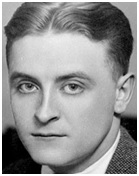|
 |
|
 |
|
|
||
The Last Tycoon - Leadership
The Last Tycoon (1941)
Written by the American, Scott Fitzgerald (1896-1940), pictured right. He also called it: The Love of the Last Tycoon: A Western.
Fun facts
Set in... Late 1930's Hollywood.
Key characters Monroe Stahr, film producer. Kathleen Moore, his lover.
The story There is a big earthquake in Hollywood, causing a flood in the studio of film producer,
Monroe Stahr. He sees two women floating on the water. One of them (an Irish lady) is the double of his dead wife and so he gets his workers to find her. They discover her name is Kathleen Moore, but she doesn’t want to know Stahr. Cecilia, the daughter of Stahr’s business partner, Pat Brady, is desperate to marry Stahr. But he says he is too busy with his work. Stahr is renowned for looking after his staff and his innovative and quality films, making it to the top from his poor Jewish upbringing in New York. At a dance with Cecilia, Stahr accidentally meets Kathleen who agrees to go out with him for lunch and then dinner. They make love in Stahr’s unfinished seaside house in Santa Monica. They walk along the beach, meeting an African American man who challenges Stahr’s ideas about the quality and
purpose of his movies. After Stahr drives Kathleen home, his housekeeper finds one of her letters in her car saying
she is engaged to someone else. Five days later, Kathleen calls Stahr, and they agree to meet at the weekend. But before then, her fiancée arrives and they are married. Stahr has a fight with a communist union official (whom he blames for a strike in his studio) and starts a romance with Cecilia. Fitzgerald’s death ended the story here, but his notes suggest that Kathleen and Stahr re-kindle their romance. Stahr struggles to stop Pat Brady taking control of his studio, and he fears that Brady will murder him. So he hires some gangsters to get him first, and realizes his mistake on a plane. But he dies in a crash before he can contact the killers and so Brady is murdered.
Lessons from Stahr’s leadership
1. Vision is vital Although he realizes the importance of profit and customer satisfaction, Stahr also wants to produce quality, artistic films. Stahr:
2. Have the determination to overcome your problems Stahr’s career is a classic rags to riches story from poor child to powerful producer. Fitzgerald likens him to the American president, Abraham Lincoln (pictured right) because they both successfully overcame so many problems.
3. Combining opposites Stahr’s success is dependent upon combining two potential opposites:
Scott Fitzgerald wrote in his autobiographical book, The Crack Up: “The test of a first rate intelligence is the ability to hold two opposed ideas in the mind at the same time and still retain the ability to function”,
4. Treat your employees well Stahr (pictured right with Kathleen in the film) is a benevolent dictator, who:
5. See the big picture Stahr was able to look at all the big issues and their interrelationships, keeping in his head “the whole equation” of a movie.
6. Get a life Stahr lives for his work, as his unfinished seaside house shows. This dedication damages his health (he has heart problems) and his personal relationships. “He was born sleepless”, Cecilia says. Kathleen is good for him, because she gets him away from the world of movies (pictured right in the film).
7. Go for it! Stahr:
He says: “There is no substitute for will. Sometimes you have to fake will when you don’t feel it at all”. 8. Love learning Stahr (pictured right in the film) has: “an intense respect for learning”. He learns from:
Key quotes on relationships (by Monroe Stahr) I like people and I like them to like me, but I wear my heart where God put it – on the inside, Stahr My heart’s in the grave, Stahr (to Kathleen).
Key quotes on work The studio is really home, Stahr. You do what you’re born to do, Stahr. He was born sleepless...without a talent for rest or the desire for it, Cecilia.
Key quotes on success and motivation There are no second acts in American lives. (meaning success comes in only one period of your life). There is no substitute for will. Sometimes you have to fake will when you don’t feel it at all, Stahr
Key quote on learning (by Monroe Stahr) You’ve got to decide—on what basis? You can’t test the best way—except by doing it. So you just do it.
Two literature websites to recommend 1. sparknotes.com 2. litcharts.com |
|
|
||
|
|
||
| Copyright © wisdomtowin.com 2025 All Rights Reserved | ||
|











